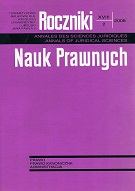Tymczasowe akty konstytucyjne w polskiej tradycji ustrojowej
Provisional Constitutional Acts in the Polish Constitutional Tradition
Author(s): Jarosław SzymanekSubject(s): Law, Constitution, Jurisprudence
Published by: Towarzystwo Naukowe KUL & Katolicki Uniwersytet Lubelski Jana Pawła II
Keywords: small constitutions; Sejm; parliament; provisional acts; political tradition; małe konstytucje; Sejm; parlament; tymczasowe akty; tradycja ustrojowa
Summary/Abstract: The subject of the article are provisional constitutional acts. Such acts are usually passe in critical and historical moments which are often crucial for the development of a given statehood in the perspective of the few successive years or even decades. Different provisional acts are often passed at specific moments of social and political strains when a country is being recreated (Polish casus of the year 1918-1919) or when its statehood is being redefined and its political system completely changed (casus of the year 1989 in Poland). From the perspective of the creation of a constitutional order, such moments are characterised by a constitutional vacuum. The situation of such tabula rasa is unfavourable for a country and its institutions. Such a situation is a threat to the country's stability and democratic fundation. Therefore, there is a need to pass provisional acts which temporarily establish rudiments of constitutional political system and ensure minimal legal order. In the Polish constitutional tradition such acts are referred to as small constitutions'. The term small' clearly indicates that such provisional acts are incomplete in terms of constitutional matters and that they are binding only temporarily. However, Polish small constitutions' are not the only provisional constitutional acts to occur in the history of Polish Constitution. Different acts which were not formally classified as small constitutions performed the same functions as these acts. Among such documents are: different executives (for instance, decrees of November 1918) and acts which cannot be even classified as legal acts but as a result of the constitutional vacuum' they performed the function of small constitutions. In the Polish constitutional tradition three following acts are considered to be small constitutions: acts of the years 1919, 1947 and 1992. All these acts were acts of the Parliament which means that the term small constitution' underlines not only the temporary emphasises and incomplete character of such acts but also the fact that they were created by a sovereign state. This means that small constitutions are special from the historical and political point of view. However, the term small constitution' has assessment qualities which indicate a specific role that a given act had in forming the fundaments of a political system of a country. What is specific about Polish small constitutions is the fact that they commenced particular constitutional eras' and determined statehood models. Therefore, the small constitution of 1919 established the fundaments of the Second Polish Republic, the small constitution of 1947 commenced the period of the People's Republic of Poland. So far the last small constitution determined the essence of the Third Polish Republic. The significance of small constitutions is therefore clearly visible, as they are provisional acts which constitute the basis for subsequent complete constitutional periods'.
Journal: Roczniki Nauk Prawnych
- Issue Year: 18/2008
- Issue No: 2
- Page Range: 69-100
- Page Count: 32
- Language: Polish

